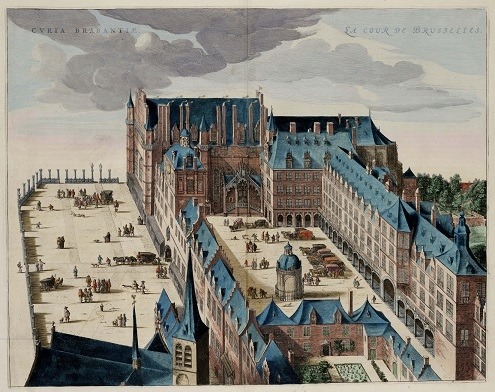Around 1430, Brussels was a little town in the Duchy of Brabant with about 7000 households, nearly all of which spoke Brabants, a Germanic dialect close to present-day Dutch. It had a beautiful town hall on its Grote Markt, but its textile-driven economy was not doing too well. An irreversible decline could not be ruled out. The local authorities then had an idea, which would prove of momentous importance for the linguistic fate of their town.
Philip the Good, duke of Burgundy, had managed to aggregate, through inheritance, marriage or conquest, quite a large territory that included Brussels, and he was in the process of creating one of Europe’s first state-like administrations. But he kept moving his court from one town to another, from Besançon and Dijon to Bruges, Ghent, Leuven, Mechelen or Brussels. Perhaps the Duke could be persuaded to settle in Brussels if the prospect was made sufficiently attractive to him?
In this hope, the Brussels authorities made him an offer. If he promised to make the town the permanent seat of his court, they would not only give him a hunting ground — a warande — just next to his palace on the Coudenberg (at the location of the current Parc Royal or Warandepark). More importantly, they would expand his palace by building at their own expense a huge room — an Aula Magna — in which he could hold parties and convene his Etats généraux, the regular meetings of the representatives of his various provinces.
The Aula Magna took about thirty years to be built (its foundations can still be visited under the Place Royale), but its erection had the intended effect. The new building — for a while the largest civil room in this part of Europe — hosted the Etats généraux consistently from 1465 onwards, as well as other memorable events such as the emancipation of Philip the Good’s great-grandson, emperor Charles V in 1515 and his abdication in 1555. Consequently, the clumsy model of the rotating capital was abandoned and Brussels gradually became, especially under Charles V, one of Europe’s most important capital cities.
What does this old story have to do with the linguistic situation of Brussels today? A great deal. Had it not been for the Aula Magna, it can safely be said that French would not be the dominant language in today’s Brussels any more than it is in today’s Mechelen or Ghent. It is to the Aula Magna that the little town of Brussels owes its promotion to capital status, and it is in French that the Dutch-dialect-speaking town of Brussels started and kept functioning as a capital city.
Similarly today, it does not need much stretching of the past nor speculation about the future to ascribe an analogous effect to the erection of another building: the Berlaymont. In the middle of the 20th century, like five centuries earlier, there was a new entity being born through gradual aggregation, one that was also destined to grow much larger in subsequent decennia and that lived for a while on the model of a rotating capital. Its smallish administration was provisionally located in Brussels in February 1958 owing to there being no consensus as to the definitive location of the seats of the Communities created the previous year by the Treaty of Rome.
Why in Brussels? Because it happened to be the capital of the country that came first, alphabetically speaking, among the six countries initially involved. Its government, therefore, was the first in charge of the rotating presidency and hence of the responsibility to provide suitable premises. This siège précaire of the commission of the European Economic Community could in principle be changed any time at short notice, but the Belgian authorities offered to erect a massive new building close to the office block occupied by the EEC’ first fonctionnaires on the Avenue de la Joyeuse Entrée. The site was that of a convent school that originated next to the cathedral, in what used to be the mansion of Charles de Berlaymont, mainly remembered for a sentence he uttered in 1567 at the entrance of the Aula Magna in order to disparage a crowd of noblemen protesting against the Inquisition: “Ne les écoutez pas Madame, ce ne sont que des gueux.”
Like the erection of the Aula Magna, the erection of the Berlaymont is now having totally unexpected linguistic consequences. Firstly, the building served as a magnet for many other new buildings hosting the institutions of what has been called since 1992 the European Union, including an hemicycle for its Parliament and, most recently, a separate building for the European Council. Brussels was thus turned, step by step, into the official capital of a political entity even larger than Charles V’s empire. Secondly, after some decades, the dominant language inside the Berlaymont and in most EU-related activities gradually switched from French to English as a result of successive enlargements.
Trickle-down effects are to be expected for the city as a whole, fundamentally analogous to those that followed, with long delays, from Brussels having emerged as the capital of the Dukes of Burgundy.
Two buildings, three languages - Why Brussels will speak more and more English
This is an opinion article by an external contributor. The views belong to the writer.


